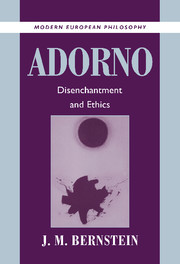Book contents
- Frontmatter
- Contents
- Preface
- List of Abbreviations
- Introduction
- 1 “Wrong Life Cannot Be Lived Rightly”
- 2 Disenchantment: The Skepticism of Enlightened Reason
- 3 The Instrumentality of Moral Reason
- 4 Mastered by Nature: Abstraction, Independence, and the Simple Concept
- 5 Interlude: Three Versions of Modernity
- 6 Disenchanting Identity: The Complex Concept
- 7 Toward an Ethic of Nonidentity
- 8 “After Auschwitz”
- 9 Ethical Modernism
- Index
1 - “Wrong Life Cannot Be Lived Rightly”
Published online by Cambridge University Press: 05 June 2012
- Frontmatter
- Contents
- Preface
- List of Abbreviations
- Introduction
- 1 “Wrong Life Cannot Be Lived Rightly”
- 2 Disenchantment: The Skepticism of Enlightened Reason
- 3 The Instrumentality of Moral Reason
- 4 Mastered by Nature: Abstraction, Independence, and the Simple Concept
- 5 Interlude: Three Versions of Modernity
- 6 Disenchanting Identity: The Complex Concept
- 7 Toward an Ethic of Nonidentity
- 8 “After Auschwitz”
- 9 Ethical Modernism
- Index
Summary
Minima Moralia's subtitle is Reflections from Damaged Life. Adorno's concept of “life” is equivocal: “reflections from damaged life” is certainly intended as the contemporary fate and an ironic inversion of what once was regarded as the true field of philosophy, “the teaching of the good life” (MM, 15); but “life” here equally means to connote the evaluative sense of organic life, the sense of “life” that gives on to vitalism; finally, Adorno intends the Hegelian notion of “ethical life,” Sittlichkeit, with its conception of social practices, customs, and institutions being the necessary mediums and supports in virtue of which individuals can possess the life they do. To assert that our ethical life is damaged is to claim that for us the good life is no longer possible, and hence that now all philosophy can do is to survey the damage, to read the ruins of ethical life as a negative expression of what has been lost and/or what we intend and hope for. Thus Adorno conceives of Minima Moralia as a “melancholy science” (MM, 15) – far removed from Nietzsche's “joyful science” (fröhliche Wissenschaft). The dominant leitmotif of Minima Moralia, the title itself an inversion of Aristotle's Magna Moralia, is the condition of damage; hence Adorno's reiterated expressions of our damaged condition:
“Life does not live.” (Ferdinand Kurnberger; MM, epigraph to Part One)
“Our perspective of life has passed into an ideology which conceals the fact that there is life no longer.” (MM, 15)
“There is nothing innocuous left.” (MM, A5). […]
- Type
- Chapter
- Information
- AdornoDisenchantment and Ethics, pp. 40 - 74Publisher: Cambridge University PressPrint publication year: 2001

